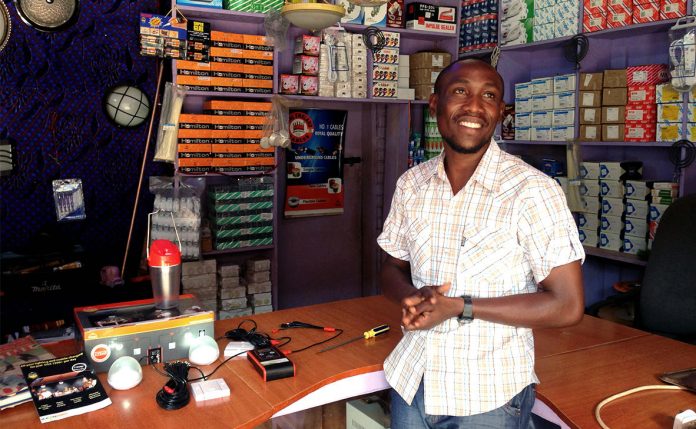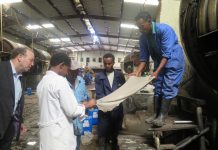The place and role of small and medium-size enterprises (SMEs) is not simply an economic issue; it is fundamentally a political one.
On the one hand, globalization has unwittingly brought about the marginalization of SMEs, most of which would have sprung from small, value-adding manufacturing processes and trading activities, particularly agricultural-based.
Where [agriculture] has been integrated into the industry cluster, this has mostly been through medium and large-scale commercial farming involving commodities such as coffee, tobacco, tea, sugarcane, edible oils and floriculture. The drivers of such agribusiness have largely been global companies, African multinationals or rich firms of nationals of Asian origin.
Put differently, globalization has contributed to the erosion of economic spaces for indigenous SMEs to grow.
On the other hand, the rise of China in the African economic space, particularly in the past decade, has brought about a dislocative pressure on indigenous SMEs in Africa and notably in the EAC and SADC regions. It is estimated that 80 percent of the Chinese companies currently operating in Africa are SMEs.
The downside of Chinese SMEs is that they normally use their own Chinese workers and thus fail to contribute either to local job creation. Indeed, Chinese nationals now compete with small business nationals in what are traditional urban market places.
This local Chinese trading phenomenon is further heightened by the monopoly of Chinese consumer goods, some of them being counterfeits, that now pervades African markets and which upsets the level playing field for locally produced goods from SMEs.
There is also another dimension why SMEs constitute a critical political issue. It relates to the agenda of economic empowerment of indigenous populations to participate more prominently in wealth creation.
Fifty years after independence of most African countries, the majority of indigenous Africans are yet to be economically empowered to own small and medium enterprises.
The wealth divide currently seen in some parts of Africa along racial lines, and which raises serious political sensitivities, is partly fuelled by the lopsided structure of ownership of SMEs.
Clearly, if this ownership structure is not quickly redressed, it could precipitate social conflict particularly where the wealth divide becomes perceived to benefit the African political class through corruption.
Another critical political dimension of SMEs in Africa centers on what is now described as the youth bulge. In the context of the EAC region, the overall youth population, which includes the under-15-year-olds, is expected to grow to 178 million in 2030, representing 75 percent of the population. Of this youth population, 31 percent will live in urban areas.
The growth of SMEs, many of which will be urban based, will be critical in creating jobs to fit this population growth.
EAC industrialization and SMEs
In December 2011, the EAC Heads of State adopted an EAC Industrialization Policy and Strategy that seeks to guide the EAC towards attaining an industrialized economic status by 2032. The action plan for implementing the EAC industrialization strategy includes the development of a regional industrial upgrading program supported by the United Nations Industrial Development Organization (UNIDO) at a cost of US$20 million, over the period 2012-2016.
The main thrust of this program is to enhance the competitiveness of SMEs. The program also seeks to contribute to value addition in SMEs. It will improve the business and regulatory environment, strengthen institutional support systems, promote technology transfers, industrial innovations and improve enterprise level investments and productivity in SMEs.
The action plan includes the establishment of a Regional Credit Guarantee Scheme to enhance credit to SMEs, which would reinforce the national credit guarantee schemes, as well as the development of an SME incubation program geared at nurturing innovative ideas.
Unfortunately, many African countries exhibit significant government incapacity to effectively support the creation and promotion of local SMEs. There have been attempts to address this shortcoming in some African countries.
For example, under President Kikwete’s leadership, the Tanzanian government has since late 2005 created a special ministry to cater for economic empowerment. The president also launched an economic empowerment fund intended to provide risk seed capital that would support budding indigenous entrepreneurs.
What is critical for growing SMEs, however, rests significantly on creating a broad supportive environment and not simply offering capital.
In sum, addressing frontally the urgency to grow SMEs in Africa has to be viewed from both the economic and political perspectives. The future of Africa’s social stability hinges not only in promoting the development of SMEs as a key catalyst of economic growth, but also, and importantly so, working out mechanisms to broaden the ownership of SMEs by enabling indigenous populations to become entrepreneurs and wealth creators.
Promoting an enterprise culture
There is a view, and Professor Ali Mazrui is one of its leading proponents, that the enterprise culture, or capitalism, in Africa is impeded and even undermined by the culture which treats capital as a source for consumption and not for saving and investment. As Mazrui puts it, Africans are predominantly “conspicuous consumptionists;” they largely suffer from what he describes as” indulgent exhibitionism.”
This view may be farfetched. Yet there are a number of cases in Africa that have gone through corporate failure because of lack of an enterprise culture. I am thus led to hold that the quest for state-driven economic empowerment of indigenous populations may not be the key strategic solution to the promotion of a successful enterprise culture in Africa.
In this context, it is important that the entrepreneurship spirit is cultivated through the education system. Part of the reason why job creation has for too long been more associated with one being employed rather than with one employing oneself, is because the entrepreneurial spirit has never been sufficiently developed as part of the national culture in Africa.
To try and jump the gun in appreciating that Africa must go through the promotion of an enterprise culture and not simply thinking that the provision of capital to business start-ups can stimulate the growth of the SME sector, can be a recipe of business failure. It is critically important, therefore, to associate what are seen to be the conventional impediments to the growth of SMEs with the development of enterprise culture.
Capital challenge
Notwithstanding the foregoing remarks, it has to be admitted that the growth of SMEs in Africa faces a number of generic challenges. The first and common challenge is the lack of access to appropriate capital, both from the banking sector and from capital markets.
There is a general perception in the financial sector that lending or provision of capital to SMEs is risky business due to a number of reasons: High mortality rate of SME businesses, poorly prepared business proposals, the lack of reliable collateral, suspect management capabilities and skills and obscure historical records of the operations of the SMEs.
In order to create a supportive environment for banks to lend to SMEs, the problem relating to collateral was uniquely addressed in Tanzania in the early 2000s. President Benjamin Mkapa had invited Hernando de Soto, author of the famous book, The Mystery of Capital, to advise the Tanzanian government on how best to fungicide property rights into capital.
The result is the establishment of a program called Mkurabita, with the mandate and task of titling peoples’ fixed assets like land and housing so that the titles can be used as collateral for accessing credit from banks and financial institutions.
Relatedly, African capital markets generally lack special instruments that can fit SMEs capital needs. These capital markets are still evolving. Where they exist, apart from South Africa, Egypt, Nigeria and somewhat in Kenya, their depth and liquidity is still very low.
In the EAC region, this market liquidity challenge has given rise to a regional approach towards financial market integration. With the support of the World Bank, the EAC is working closely with national capital market authorities to create a regional capital market whose flagship will be a regional stock exchange.
Under the project, a uniform regulatory framework is being formulated. The rationale of this program is that a well-functioning, liquid and robust regional capital market will leverage efficiency, lower transaction costs and spur cross-border economic activities.
It is envisioned that a robust regional capital market can become a viable vehicle for bolstering financing options to SMEs and thereby catalyze the growth of SMEs.
This alternative option for financing SMEs, especially for providing equity financing, should rid the necessity for SMEs to rely solely on bank credit, where the conditions for finance are too rigorous and harsh for SMEs to fulfill.
SME stock exchanges
Going forward, it would be necessary to develop exclusive stock exchanges for SMEs because the conventional stock market listing qualifications applicable to large companies in terms of minimum share capital, profit history, pre-tax profit and annual listing fees are well beyond the capacities of SMEs.
SME-dedicated stock exchanges are beginning to emerge in Africa. An example is AltX, Africa’s first alternative stock exchange for SMEs, which is a partnership between the Johannesburg Stock Exchange Ltd. and the South African Department of Trade and Industry.
SME credit guarantee schemes
Another model of financing for SMEs that needs to be enhanced and improved relates to the creation of credit guarantee schemes engineered by the central banks in the EAC and other African regions.
The Bank of Tanzania and the Bank of Uganda, for example, have led the way in promoting such schemes, whereby loans are given to SMEs, as well as farmers, through licensed banks. The central banks guarantee such loans. They share the risks with the licensed banks on the guaranteed loans up to 50 percent of the principal amount.
So far, the guaranteed loans are for SMEs involved in manufacturing, agro-processing and services such as tourism. They also cater for non-traditional exports.
In the context of developing markets for SMEs across borders in Africa, it will be essential to develop innovative regional credit guarantee schemes of the type the EAC is considering and which might later take a continent-wide dimension. Such a scheme would enable SMEs that are focused on production of goods and services for cross-border trade to secure risk working capital, as well as trade finance from commercial banks.
Alternative financial instruments
Another interesting feature in developing appropriate financial intermediation for SMEs is the role of special investment funds that can fund commercial banks to reduce their risk profiles in lending to SMEs.
There is thus need to explore the securitization of SME loans in Africa as a basis for enhancing access to debt finance. Such a development would need the establishment of special platforms for transferring credit risks to capital markets.
In turn, African countries may consider putting in place the equivalent of the European Investment Fund (EIF), which provides funding to commercial banks to leverage their lending capacities for extending loans to SMEs. Such securitization of SME loans also opens up possibilities for banks to attract capital for SMEs from pension funds.
Here again, development banks like the Development Bank of Southern Africa, the East African Development Bank, and similar development banks in West Africa could explore the possibility of establishing special investment funds of the EIF-type. I believe that the African Development Bank has already crafted such a scheme.
Ambassador Juma V. Mwapachu is president of the Society for International Development and former secretary general of the East African Community. The above is an edited excerpt of his keynote speech at the 3rd African Governance, Leadership and Management Convention, August 5-9, 2012, in Mombasa, Kenya.













